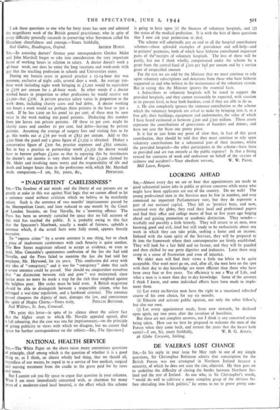SIR,—In assessing doctors' finance your correspondents Gordon Malet and John
Marshall forgot to take into consideration the very important factor of working hours in relation to salary. A doctor doesn't work a 48-hour week, nor does he enjoy the long vacations and week-ends with pay that the teaching profession in schools and Universities enjoy.
During my busiest years in general practice a 13-14-hour day was common, exclusive of night calls, several days a week. An average too- hour week including night work bringing in £1,2oo would be equivalent to £576 per annum for a 48-hour week. In other words if a doctor worked hours in proportion to other professions be would receive not £42oo—but £576. A private practice salary varies in proportion to the work done, including charity cases and bad debts. A doctor working too hours a week would see perhaps three patients in the hour or 30o a week. If he has J,000 on his panel to per cent. of these may be seen twice in the week making zoo panel patients. Deducting this number from 300 leaves too private patients. Of these to per cent. might be charity cases and another to per cent. bad debts—leaving So private patients. Assuming the average of surgery fees and visiting fees to be 4s. this works out at £16 per week or £832 per annum. Add to this £5oo from the panel and a gross figure of £1,332 is obtained. Deduct a conservative figure of £5oo for. practice expenses and £832 remains. But to buy a practice or partnership worth £1,332 the doctor would have to borrow perhaps £3,000 so that in repaying this by instalments the doctor's net income is very short indeed of the £1,2oo claimed by Mr. Malet and involving more worry and the responsibility of life and death and longer hours than in the professions with_ which Mr. Marshall made comparison.—I am, Sir, yours, &c., PHYSICIAN.


























 Previous page
Previous page